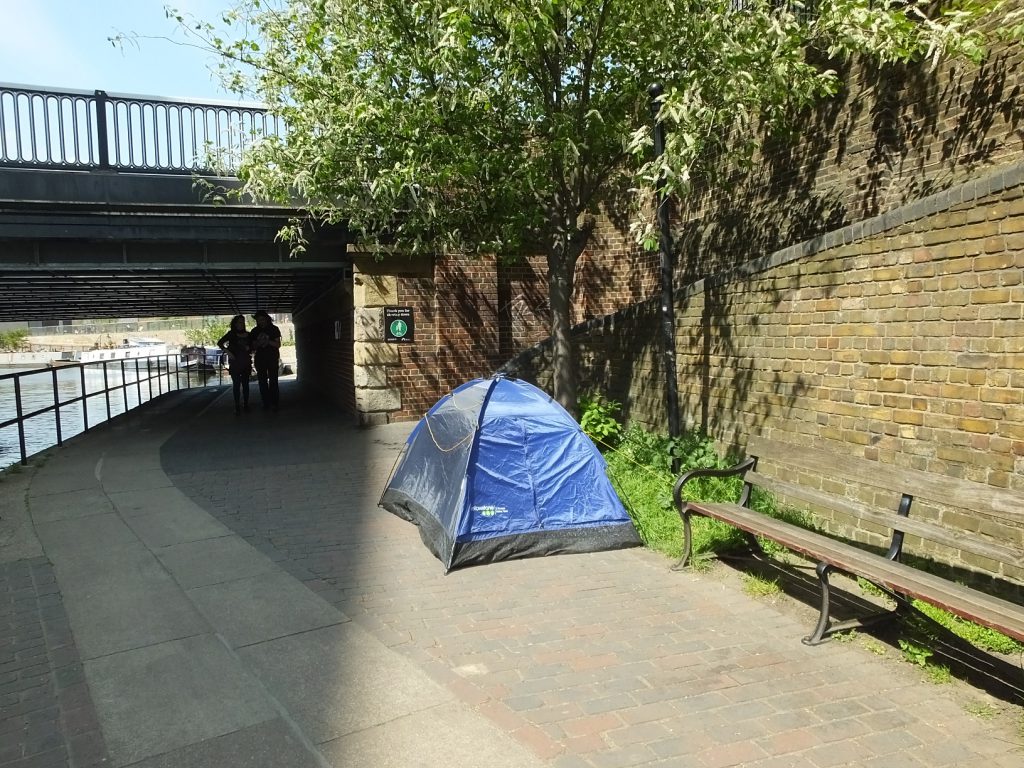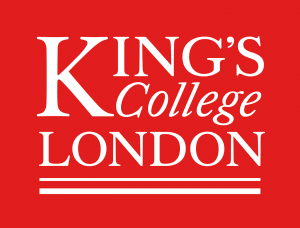The rise in rough sleeping in the UK is shaped by policies of austerity and exclusion. Yet, increasingly, public policy responses frame homelessness as an individual problem. This is a problem for us to think about in our teaching and research on public health: this disconnect between the social determinants of health and then an individual focused response. How can we refocus this debate?

Regent’s Canal in Islington, London. York Way bridge – a homeless Mancunian’s dwelling. Photo by Clem Rutter.
The death of a man in February 2018 who had been sleeping rough in Westminster underground station in London generated widespread media interest. Yet this media interest seemed to focus on the individual and their ‘choices’ rather than the political choices that produce homelessness. As always, charity was seen as the core mode of response.
That a death occurred at the doors of the UK parliament underscores the discomforting truth that homelessness is tied to political decisions. And yet public debate is neutralising this by ignoring systemic forces and seeing homelessness as an isolated issue, with homeless people seen as separate from the rest of society.
Increasing levels of homelessness can be seen as direct consequences of austerity, financialisation of the housing sector, insecurity of private sector renting and flexible low-paid work. There is no attempt at meaningful reform of a housing system that has clearly failed so many. A pattern of public problem being discussed as individual failing is one we can see across the world, for the response to homelessness, but also many pressing health issues.
Crisis, a homelessness charity, recently outlined how social attitudes in the UK to the homeless echo this non-political tone, emphasising morality, individualism and choice. The person out of place on the street commonly elicits sympathy but also elicits responses around the individual needing to guide themselves towards recovery and as being held as responsible for their choices. A logic of ‘choice’ for sleeping in Westminster underground station does not marry up to the practical experience – it seems a strange choice to make. The precarious health of people who are homeless reflects a lack of food, shelter and support. Rather than individual choice, these examples reflect political choices that led to the erosion of support services and social housing. And yet, whilst these public attitudes might neglect complexity they are nonetheless important to consider: these public attitudes shape public policy, by being the pressure on politicians, and by being the attitudes that politicians and policy makers themselves hold.
So what to do? As the Crisis report argues, we need new frames for debate on homelessness that can respond to this harsh climate and a focus on individuals and their ‘choices’. They suggest an emphasis on systems and solutions, rather than repeating solely the extent of the problem.
A public health analysis within this debate is urgent to ensure a more critical response to experiences of social exclusion. This is something KCL is at the forefront of doing, particularly through the Social science for Urban Public Health Institute (SUPHI) and then social science teaching through the Public Health MSc, notably on the Sociology for Public Health module. The report from Crisis is a reminder that our public health research and teaching needs to focus on high quality theory, but also in ensuring this is communicated to the public in ways that are meaningful and effective.
To add to the work of Crisis, perhaps we could add the findings from public health research of how these same systems that generate homelessness also impact the rest of society. A core message for the public could then be: tackling homelessness is an urgent problem. But a political and social one. The systemic forces shaping homelessness also have broader effects which is increasingly clear: health services are challenged, and rising housing markets are only benefiting a few. And so the health of the city’s most vulnerable is also a grim barometer of the health of the city that we all live in– the health services and housing markets letting the homeless down, affect us all. This is not to suggest that everyone is equally vulnerable to becoming homeless, or that ill-health is experienced the same, but that the sickness in the systems of the city impacts all.
Andy Guise (@andyguisekcl) is a lecturer on social science and health. He leads the Public Health and Primary Care Dissertation module on the MPH and teaches on the Sociology for Public Health module on the MSc.

Thank you. In the late sixties, early seventies, when I worked as a junior doctor in public health in the London Borough of Redbridge, I took it in to my head to “ see” some poor people sleeping on the Embankment. They would not have talked to a suited booted chap. I dressed informally, my wife dropped me off near Westminster Bridge and I trudged to where the benches were. I found one unoccupied and slouched on one.
Some of the rough sleepers were easy to talk to. Some were suspicious. A few were wearing old army trousers.
In those days, you could see, in Oxford Street, men begging. They claimed to have served in the army, been discharged without help to adjust to civilian life. Were some of the rough sleepers choosing the way of life? Were some going through mental difficulties? Maladjustment to civilian life? Were some “ disappearing “ from their spouses, families for legal reasons?
At KCL, perhaps you are able to study these matters.
When I moved to Peterborough in 1974, as district community physician ( you won’t have heard the term), I saw only two homeless men in the City,